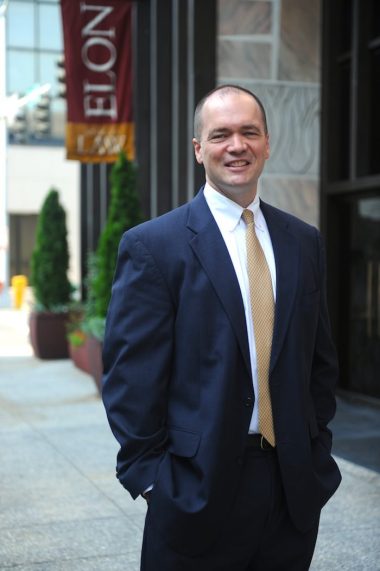Elon law professor Scott Gaylord recently sat down with two television news stations to give his perspective on a recent federal circuit court decision which held that prayers recited in Forsyth County public hearings are unconstitutional.

The ruling in Joyner v. Forsyth County by the U.S. Court of Appeals for the Fourth Circuit goes back to events that occurred in December 2007. During that time all Forsyth County Board of Commissioners began with an invocation delivered by a local religious leader. On December 17, 2007, the opening prayer made several references to Christianity, “Virgin Birth,” and “Gospel of the Lord Jesus Christ.”
In response, two citizens filed suit against the county, alleging that the December 17 prayer was unconstitutional because the Board was sponsoring sectarian opening prayers at its meetings. The district court concluded that the Board’s legislative prayer policy violated the Establishment Clause by advancing and endorsing Christianity to the exclusion of other faiths.
The decision was appealed, and on July 29, 2011, the U.S. Court of Appeals for the Fourth Circuit agreed with the district court that the December 17 prayer crosses the constitutional line. Gaylord provided commentary on the decision on WFMY News 2 and WGHP Fox 8.
“The First Amendment speaks about speech and religion,” explained Gaylord. “In this case, you actually have the intersection of those two things, and I think that puts a unique spin on it. The government is controlling the stage and forum in which these prayers are taking place, and even if an individual comes in and wants to claim a freedom of speech right, the government is still limited by the Establishment Clause of the First Amendment as to what the government can or cannot allow at their board meetings.”
In his interviews, Gaylord predicted that the Board of Commissioners would likely appeal this decision, and that is exactly what they plan to do. On August 8, the Board voted to take their case to the U.S. Supreme Court.
In February, Gaylord explained that the issue related to the specific kind of prayer in which public officials engage.
“As the district court opinion acknowledged, local commissioners are allowed to have some form of prayer, but it would have to be what’s called non-sectarian prayer, which would be a general reference to the divine, to God generally, possibly reference to a heavenly father, but not talk of Jesus, Jesus Christ, the Trinity, possibly Allah, as specific references that the district court held were problematic,” Gaylord said.
Speaking with WFMY News 2, Gaylord said the Forsyth County case contained unique elements of the debate over separation of church and state that merit consideration of the federal courts.
Professor Gaylord’s recent article, “When the Exception Becomes the Rule: Marsh and Sectarian Legislative Prayer Post-Summum” is forthcoming in the University of Cincinnati Law Review.
He is also author of “Licensing Facially Religious Government Speech: Summum’s Impact on the Free Speech and Establishment Clauses,” published in the Spring 2010 issue of the First Amendment Law Review of the University of North Carolina School of Law.
In the fall of 2010, at the Loyola University Chicago School of Law’s Constitutional Law Colloquium, he presented “Neutrality and Accommodation at the ‘Cross’-Roads: The Majoritarian Ascendency in Establishment Clause Analysis” exploring the implications of the United States Supreme Court’s recent decisions in Salazar v. Buono (2010) and Pleasant Grove City v. Summum (2009).
By Danielle Appelman, L’12


